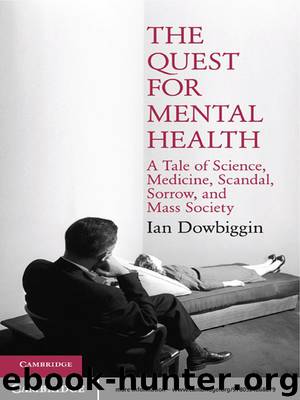The Quest for Mental Health (Cambridge Essential Histories) by Dowbiggin

Author:Dowbiggin
Language: eng
Format: mobi, epub
ISBN: 9781139090445
Publisher: Cambridge University Press
Published: 2011-05-01T04:00:00+00:00
LAST RESORT
Often dismissed as desperate stabs in the dark by self-interested psychiatrists obsessed with the goal of proving that their discipline was a legitimate medical specialty, lobotomy, ICT, ECT, and focal infection theory were instead the result of a mix of motives. To many psychiatrists, lobotomy seemed to prove that mental disabilities were indeed rooted in the anatomical structure of the brain, thus confirming that their specialty was not limited to the study of the psyche. The reason usually cited for the rapid falloff in the lobotomy rate in the 1950s was the introduction of the new anti-psychotic drugs, notably chlorpromazine. Undoubtedly, the arrival of medications that made schizophrenic patients in hospitals not only less agitated and troublesome, but also eligible for discharge into the community was a major advance in therapy. However, in some localities such as Israel, lobotomies were still being performed into the 1970s, long after such drugs had been introduced, and by the dawn of the twenty-first century, ECT, far from declining due to increased drug use, was enjoying a revival in many countries.
The dominance of psychoanalysis and similar forms of psychotherapy within psychiatry was another factor contributing to the decline of psychosurgery. Yet even Freud’s biggest converts conceded that psychoanalysis was useless for “mental patients in the mass.”105 It would be comforting to imagine that enthusiasm for lobotomy ebbed because of humane revulsion over the operation among psychiatrists, but in the procedure’s early stages even its advocates grimly conceded that it involved the destruction of brain matter. No one had any illusions about what the operation did to either brain tissue or a patient’s personality.
Early on, media coverage certainly helped to quiet doubts about lobotomy. The press, often relying on what pro-lobotomy physicians told them, normally showered the operation with praise. Some U.S. journalists were critical, but generally most were caught up in the general enthusiasm over surgical solutions to medical conditions. The New York Times editorialized in 1949 that “surgeons now think no more of operations on the brain than they do of removing an appendix.” The brain was “just a big organ … no more sacred than the liver.”106 In 1947 the title of a Life magazine article read, “Operation to Cure Sick Minds Turns Surgeon’s Blade into an Instrument of Mental Therapy.” The Life article used Freudian terminology to argue that by severing the nerve connections between the prefrontal areas and the rest of the brain, the neuro-surgeon was freeing the mind from the tyrannical superego. Reporters dazzled by the seeming march of medical science overlooked this awkward mixing of psychoanalysis and brain surgery.107
Yet positive press coverage alone could not account for lobotomy lasting as long as it did. Clinical results suggested that, although from time to time surgeons operated on mental patients whose conditions did not warrant the procedure, other patients did actually improve after psychosurgery. In the 1930s a middle-aged Florida druggist tried to commit suicide twice and was institutionalized for a year and a half with severe depression. Forty days after the operation he was well enough to be sent home.
Download
The Quest for Mental Health (Cambridge Essential Histories) by Dowbiggin.epub
This site does not store any files on its server. We only index and link to content provided by other sites. Please contact the content providers to delete copyright contents if any and email us, we'll remove relevant links or contents immediately.
Should I Stay or Should I Go? by Ramani Durvasula(7652)
Why We Sleep: Unlocking the Power of Sleep and Dreams by Matthew Walker(6704)
Fear by Osho(4727)
Flow by Mihaly Csikszentmihalyi(4687)
Rising Strong by Brene Brown(4449)
Why We Sleep by Matthew Walker(4434)
The Hacking of the American Mind by Robert H. Lustig(4375)
How to Change Your Mind by Michael Pollan(4355)
Too Much and Not the Mood by Durga Chew-Bose(4337)
Lost Connections by Johann Hari(4173)
He's Just Not That Into You by Greg Behrendt & Liz Tuccillo(3891)
Evolve Your Brain by Joe Dispenza(3671)
The Courage to Be Disliked by Ichiro Kishimi & Fumitake Koga(3488)
Crazy Is My Superpower by A.J. Mendez Brooks(3398)
In Cold Blood by Truman Capote(3374)
Resisting Happiness by Matthew Kelly(3337)
What If This Were Enough? by Heather Havrilesky(3308)
The Book of Human Emotions by Tiffany Watt Smith(3300)
Descartes' Error by Antonio Damasio(3270)
